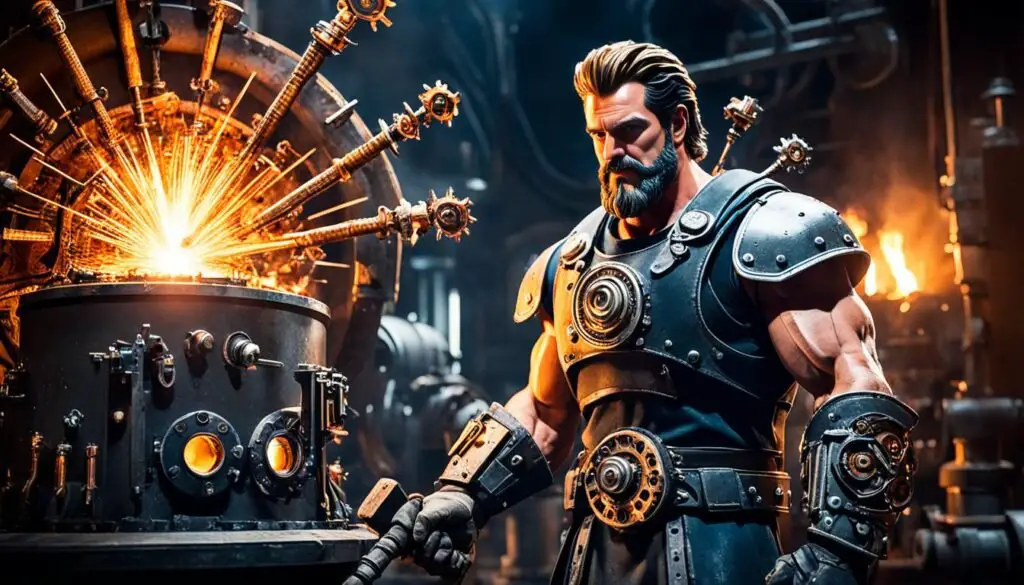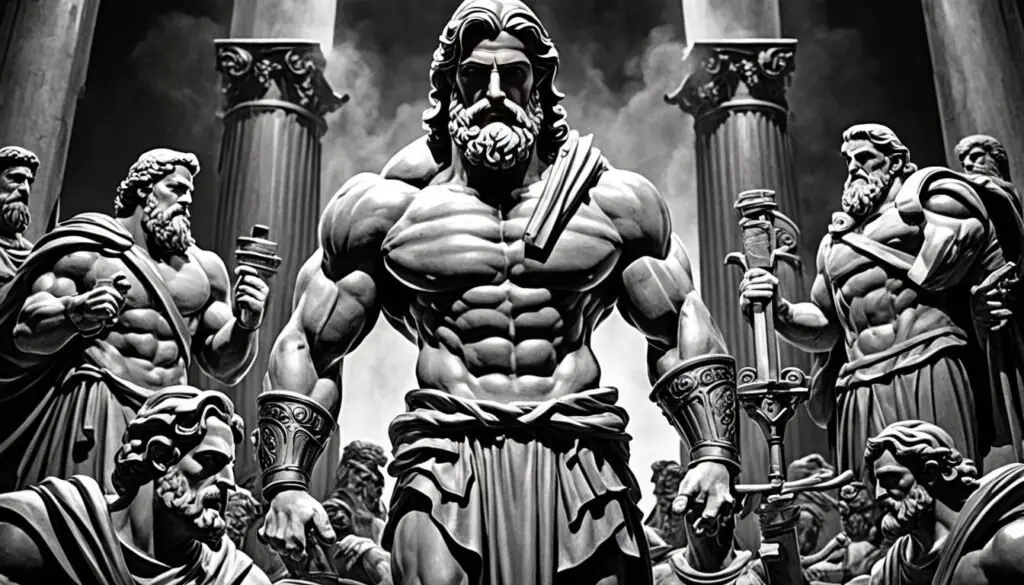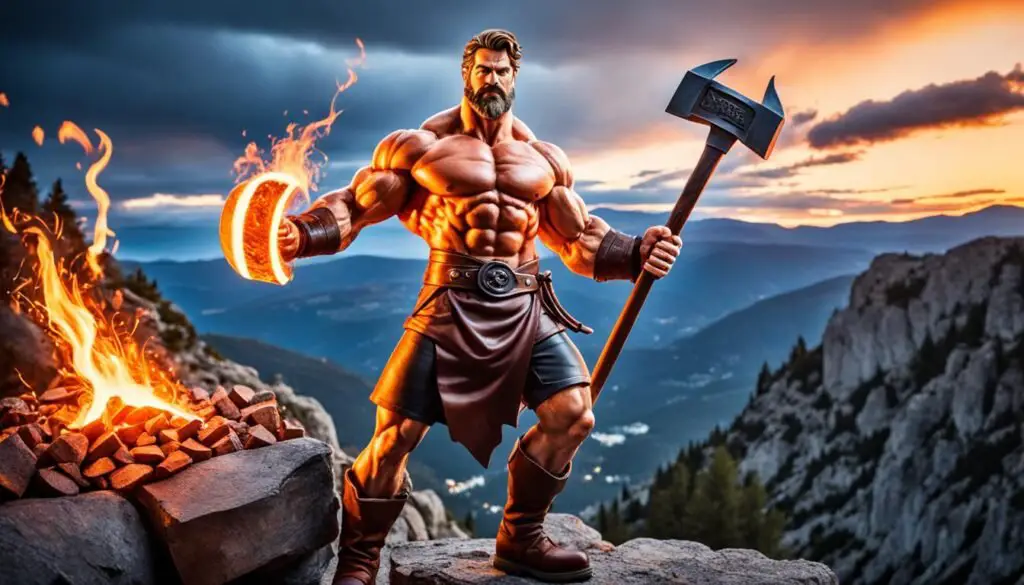In the world of Greek gods, Hephaestus is unlike any other. He’s the master blacksmith and handles fire too.
Even though he was physically different, Hephaestus was known for his amazing work and ideas.
Hephaestus has a very interesting story in mythology. He was born to Zeus and Hera, and thrown off Mount Olympus because of how he looked.
But, he landed in Lemnos. There, he got good at making things. When he went back to the gods, they welcomed him.
This showed how much they valued his skills.
Hephaestus is famous for making awe-inspiring weapons and not-so-real people too.
His workshop was full of life with its fires and bellows. It was the place where many epic items in Greek myths were made.
Key Takeaways
- Hephaestus was the Greek god of fire, metalworking, and craftsmanship
- He was known for his exceptional skill in creating weapons and magical objects
- Despite his physical limitations, Hephaestus held a significant position among the Olympian gods
- His workshop was said to be located on Mount Olympus or volcanic islands
- Hephaestus played a key role in many Greek myths, including the creation of Pandora
Introduction to Hephaestus: God of Fire and Metalworking
Hephaestus is the divine craftsman of Mount Olympus, known among the Greek gods. He was born to Zeus and Hera.
Hephaestus is famous for his metalworking skills and knowledge of fire. His physical flaws didn’t stop him from making amazing things.
He was a master at working with stone, sculpting, and forging objects. His workshop was under volcanoes like Mount Etna, always full of life.
There, he made everything from powerful weapons to magical tools.
Hephaestus had an unusual marriage to Aphrodite, the goddess of beauty, set up by Zeus.
This was to keep peace among the gods. Even though he had a disability, his work was flawless, making him very important in tales of ancient Greece.
- Known for creating Achilles’ armor
- Crafted Athena’s aegis
- Fashioned Eros’ arrows
While there weren’t many temples dedicated to him, craftsmen held small ceremonies to honor Hephaestus.
Athens and Lemnos, an island, were important sites for his worship. They praised his influence on art and craftsmanship.
Who Was Hephaestus in Greek Mythology
Hephaestus is a special Olympian god in Greek mythology. He was born with a broken foot, facing challenges early on.
Still, he became a key god despite looking different from others.
Origins and Parentage
Hephaestus’s birth story is a bit mysterious. Some stories say Zeus and Hera are his parents. Others say Hera is his mother.
What’s clear is that he was the only god born with a disability.
Role Among the Olympian Gods
Being the god of fire and metalworking made Hephaestus important to the Olympians.
He created their weapons and tools. Zeus’s thunderbolts and Achilles’ armor were among his notable works.
Despite being rejected from Olympus, he later returned as a key god.
Symbols and Attributes
Hephaestus’s tools like a hammer, anvil, and tongs show his skill in metalworking.
- Hammer
- Anvil
- Tongs
In many stories, he’s working at his forge. His creations were highly valued by gods and people.
Legends speak of the amazing things he crafted.
The Craft and Artistry of Hephaestus
Hephaestus was known as the greatest craftsman in ancient Greece. Everyone admired his amazing skills in making things from metal.
He started working on Lemnos where he became a true expert.
Below Mount Etna, he had a workshop. There, he made things like weapons, armor, and items with magic for the gods.
Some of his most famous works were:
- Zeus’ scepter and aegis
- Hermes’ winged helmet and sandals
- Achilles’ legendary armor
- Aphrodite’s enchanting girdle
But Hephaestus was more than just a metalworker. He was great at many other crafts too.
For instance, he made Pandora, the first woman, from clay. This showed his talent for making sculptures.
His workshop was like no other. He had twenty bellows that helped make his forge hot.
The Cyclopes worked with him, using their great power. Thanks to Hephaestus, blacksmiths, and artists were inspired for years to come.
Hephaestus’ Legendary Creations and Automatons

In Greek mythology, Hephaestus was known for his outstanding craftsmanship.
His talent with ancient tech was beyond compare. The divine blacksmith’s workshop was full of amazing creations, making even the Olympians amazed.
Weapons and Armor for Gods and Heroes
Hephaestus crafted incredible weapons and armor. He made Zeus’s thunderbolts and the Aegis breastplate that no weapon could pierce.
Heroes like Achilles got their special armor from him. These items often changed the fate of battles in ancient stories.
Magical Devices and Automatons
Hephaestus showed his brilliance through his automatons. He made 20 wheeled golden tripods that could walk by themselves.
His work included fire-breathing horses and watchdogs that protected palaces. These creations highlighted Hephaestus’ skills in both mechanics and magic.
The Creation of Pandora
Creating Pandora, the first woman, was a key moment for Hephaestus. Zeus gave him the task as a way to punish mankind.
Hephaestus formed Pandora from clay and brought her to life. This action tied him to the famous Pandora’s box story.
It shows how Hephaestus could influence gods and humans with his craft.
From weapons to pieces of art that came to life, Hephaestus brought ancient tech to its peak. His creations mixed mastery, a touch of magic, and great ideas.
They greatly impacted Greek myth and culture.
Myths and Legends Surrounding Hephaestus
For ancient Greeks, Hephaestus was a key Olympian god, known for his forge and fire.
His story is both tragic and awe-inspiring. Born with a deformity, he was thrown off Mount Olympus by his mother, Hera.
Despite his rough start, Hephaestus mastered the arts of fire and metalworking.
His craftsmanship was unsurpassed. He created stunning items for the gods, like pins and cups, for nine years.
One intriguing myth is about his revenge. Hephaestus made a magical throne that entrapped Hera.
He wouldn’t free her until Dionysus, the god of wine, intervened.
His marriage to Aphrodite kept peace among the deities, but it was troubled. Aphrodite’s affair with Ares, the god of war, sparked a major Greek myth.
Hephaestus cleverly trapped them in a golden net, shaming them before all the gods.
- Hephaestus crafted a fine golden net to catch the lovers
- He trapped Aphrodite and Ares, exposing their affair to all the gods
- His skill as a craftsman is highlighted in this story
The legends around Hephaestus are rich in lessons and thrills. Even today, stories of his rejection, revenge, and genius are still told and loved.
Hephaestus’ Relationships with Other Gods

In Greek mythology, Hephaestus’ relationships were intricate like his designs. The way the Olympian gods interacted showed a lot about human emotions.
And Hephaestus’ bonds were just as deep and complex.
Marriage to Aphrodite
Hephaestus and Aphrodite’s marriage was a fusion of opposites. She was the radiant goddess of love, and he was the skilled craftsman.
They weren’t a match made in heaven, mainly because Aphrodite cheated on him with Ares, the war god.
This caused quite a stir in the divine world. The affair brought betrayal and revenge to the gods’ doorstep.
It showed that even divine couples have their problems.
Rivalry with Ares
Hephaestus’ and Ares’ rivalry symbolized a broader conflict. It wasn’t just about personal grudges.
It reflected the tension between the arts of peacekeeping and the violence of war in Greek society.
Their mythological clashes highlighted these themes. They brought the tension between craftsmanship and conflict to life.
These stories showed the gods’ complex nature and their world’s dynamics.
Collaboration with Athena
Unlike his turbulent marriage, Hephaestus found true camaraderie with Athena. They shared an interest in crafts and skills.
This common ground led to a productive partnership, creating many legendary items in Greek myths.
Hephaestus’ family was a diverse one. He had loves from all over, including a marriage to Athena. He also had relationships with nymphs.
These love stories resulted in many children, adding depth to Greek myth.
His artistry wasn’t just for his family, though. He also created gifts for his fellow gods.
One of his creations, Hera’s throne, caused quite a funny incident. Hera found herself stuck until
Dionysus helped her, highlighting how the gods often depend on each other.
If you want to explore more about Hephaestus’ relationships, this comprehensive guide is a great start.
It offers detailed stories of his loves and offspring, diving deep into Greek mythology.
Worship and Cult of Hephaestus in Ancient Greece
In ancient Greece, Hephaestus was special in their religion. He had few famous places of worship, but people loved him in places where things were made.
Mainly, people honored him in Lemnos and Athens. These places showed how much they valued his work in skillful crafting and industry.
High above Athens in the Kerameikos district, the Temple of Hephaestus stands proud.
It was constructed for him from 449 to 415 BC. This temple is not too big, about 13.71 m by 31.78 m, but it’s grand with 6 columns on its sides and 13 in the middle.
The Khalkeia festival was a big deal. Athenians held torch races and honored the god with their metalwork.
Lemnos, known for Hephaestus’ forge and his Kabeiroi sons, had an important place for his worship.
His cult spread to Sicily. There, temples at Eryx and on Mount Etna kept holy fires. The Lipari Islands, once named the Isles of Volcanus, showed its link to volcanoes.
In the cult, Hephaestus had many names that praised his skills and features:
- Clytus
- Periclytus
- Agaclytus
These names talked highly of his craftsmanship, creativity, and strength.
People mixed stories and deep respect for Hephaestus in their worship. They saw him as a god of creation.
This was very appealing to craftsmen and blacksmiths. They believed their work was a way to honor his amazing talents.
This mix of myth and job formed the heart of Hephaestus’ worship in ancient Greece.
Hephaestus in Art and Literature
Hephaestus, the Greek god of fire and metalworking, is well-known in art and literature.
Artists show him as a bearded, strong man in their work. He’s often seen with tools like a hammer and anvil, which he uses for his craft.
Writers like Homer and Hesiod wrote about Hephaestus too. They told stories of his unique role in both creating and being an outcast in the gods’ world.
His challenges and complicated relationships give depth to his character.
Today, Hephaestus is still a part of stories in books, movies, and TV. These modern tales highlight his creativity and clever solutions.
They keep the old myths fresh and interesting for new audiences.
Frequently Asked Questions
Is Hephaestus a child of Zeus?
Yes, in some myths, Hephaestus is considered a child of Zeus and Hera. However, there are also versions of the myth where Hera alone gives birth to Hephaestus without Zeus’s involvement.
Why did Zeus hate Hephaestus?
Zeus’s animosity towards Hephaestus varies in different myths. One reason is Hephaestus’s siding with Hera against Zeus. Additionally, Hephaestus’s physical deformity and perceived imperfections might have contributed to Zeus’s disdain.
Who was Hephaestus’s second wife?
Hephaestus’s second wife was Aglaea, one of the Charites (Graces). She was known for her beauty and grace, and their marriage is depicted as a harmonious union.
How many wives did Hephaestus have?
Hephaestus had two prominent wives in mythology: Aphrodite, the goddess of love and beauty, and Aglaea, one of the Charites. Different myths might mention other consorts, but these two are the most well-known.
Did Hephaestus get Athena pregnant?
No, Hephaestus did not get Athena pregnant. According to myth, Hephaestus attempted to seduce Athena, but she resisted. In the struggle, his semen fell on the ground, resulting in the birth of Erichthonius, a mythological king of Athens.
Was Hephaestus forced to marry Aphrodite?
In some versions of the myth, Hephaestus was forced to marry Aphrodite as a reward from Zeus for releasing Hera from a magical trap. The marriage was not a happy one, as Aphrodite had numerous affairs, most notably with Ares, the god of war.
Did Aphrodite have a child with Hephaestus?
No, Aphrodite and Hephaestus did not have any children together. Aphrodite had children with her various lovers, including Ares and the mortal Adonis, but none with Hephaestus.




